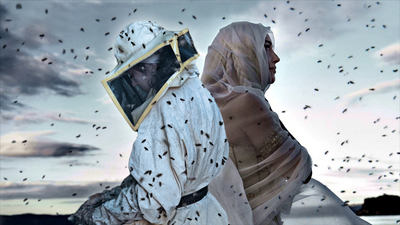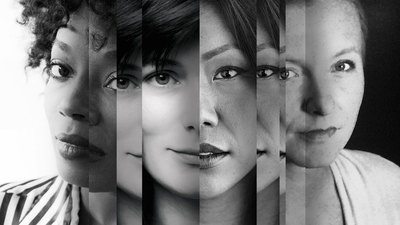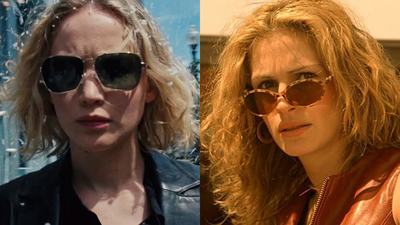
BY MATTHEW ENG |
Don’t Believe the Bad Buzz: FREEHELD is More Than Worth Your Time
Peter Sollett’s real-life gay rights drama tells an emotional, enlightening, and timely story with committed performances from Julianne Moore and Ellen Page. So why are critics scoffing and audiences staying away?
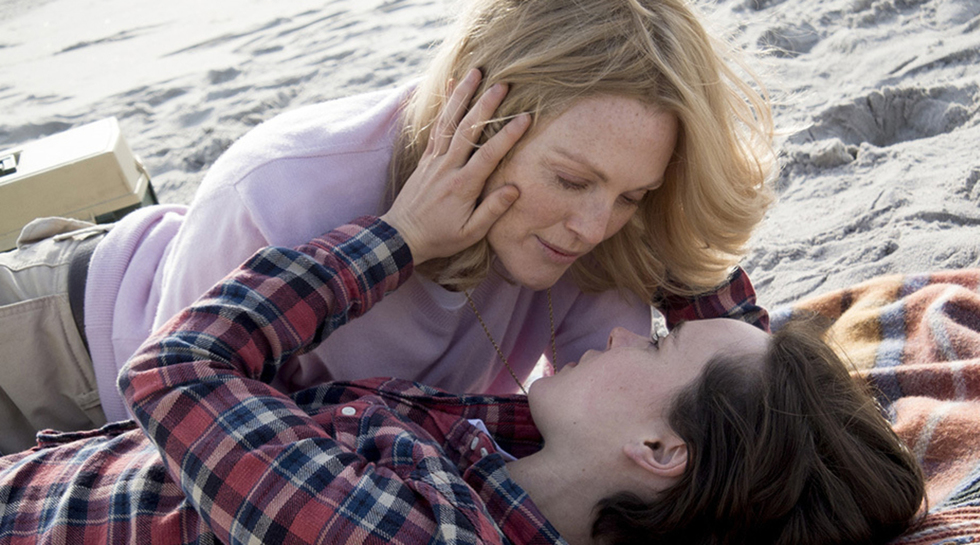
At an encore New York Film Festival screening of Todd Haynes’ extraordinary ‘50s-era lesbian romance Carol this past week, I overheard a trio of male audience members in the row behind me discussing Julianne Moore, who remains Haynes’ most dazzling cinematic muse and one of our greatest screen actresses, dead or alive. The conversation veered from the Haynes collaborations to Magnolia to her spry supporting turn in Maggie’s Plan, which was also screening at NYFF this year. The conversation then turned to Moore’s starring role in Freeheld, which by that point was already floundering in limited release after making a dismissive debut at the Toronto Film Festival.
“Oh yeah,” said one of the guys, “apparently that movie’s garbage…”
Freeheld has become one of the fall season’s most threadbare punching bags. At the time of my writing this, the film’s Tomatometer score stands at a piddling 44% and its slowly-expanding release has so far yielded disappointing receipts for a picture whose first-billed star led her Best Actress indie vehicle Still Alice to an $18-million box office haul earlier this year. Based on these facts alone, I suppose that, yes, a movie like Freeheld could probably be considered “garbage.” But does anyone remember what this story is actually about?

In 2005, longtime Ocean County, New Jersey police officer Laurel Hester (above right) was diagnosed with stage-four lung cancer. When it soon became clear that the disease was terminal, Hester made arrangements to transfer her pension benefits to her domestic partner, Stacie Andree (above left), only to find her request vetoed by the Ocean County Board of Chosen Freeholders on the grounds that such a move could not be made for a same-sex couple. In response to this rejection, Hester, Andree, and their friends and family teamed up to challenge the board and fight for the couple’s equality.
It’s the type of stirring, real-life story that seems destined for filmic treatment — and, in fact, it’s already been made into a movie. Cynthia Wade’s 2007 documentary short of the same title chronicled the couple’s battle to critical and audience acclaim, winning an Oscar in the process. For its dramatic interpretation, one could hardly find two more equipped performers to fill Laurel and Stacie’s shoes than, respectively, Moore and fellow leading lady Ellen Page, who also served as a producer on the project. Add to the cast two consummate character actors like Michael Shannon and Steve Carrell, a script by industry veteran Ron Nyswaner, and a worthy helmer in the form of respected indie director Peter Sollett, and Freeheld looks like the type of buzzy project that immediately sets off the “Oscar” lightbulb in Hollywood’s brain. And it did, for a while, aided in no small part by a well-timed, teary-eyed trailer that was released right on the heels of the Supreme Court’s landmark gay marriage ruling, which the spot meaningfully alluded to with its “Love is Love” tagline. So, what happened?
The film received nothing short of an all-out critical drubbing at Toronto, where Time Out New York’s David Ehrlich referred to it as “a Lifetime movie nightmare” and “a worst of the year contender,” an opinion echoed a few weeks later by Manohla Dargis, who deemed it “a television movie of the week gone uninterestingly wrong” in her official New York Times review. The critical consensus seems to suggest a promising premise undone by flat filmmaking and an overly-earnest take on its true-life material. And its tepid commercial reception is dooming it to the paltry handful of LGBTQ-geared movies that have failed to ignite audiences — that is, when they’ve even been released. Nothing else needs to ever be said about the all-around embarrassment of Roland Emmerich’s Stonewall, but Gaby Della’s About Ray (below), in which Elle Fanning and Naomi Watts play, respectively, a transitioning F-to-M teen and her conflicted mother, found itself pulled within a mere matter of days from its mid-September release without explanation. Meanwhile, Sean Baker’s riotous trans-groundbreaker Tangerine was rapturously received by critics over the summer but stalled out in limited release, and while Oscar hopes are certainly high for Tom Hooper’s prestige-laden The Danish Girl and Haynes’ Carol, the commercial prospects of the Eddie Redmayne and Cate Blanchett-starers remain to be seen.

In the minds of many prognosticators, Freeheld seemed fated to join Carol and The Danish Girl at the Kodak Theatre come February, at the very least for its superb co-stars and the redoubtable Michael Shannon, who gives a touchingly grounded performance as Laurel’s progressive partner that a number of critics have claimed just barely saves the movie from being…. well, garbage. Deterred by the middling reviews and unfortunate box office, I guiltily stayed away from Freeheld for the first two weeks of its release, aka the window when my dollars surely would’ve mattered most, a fact I ashamed to admit as someone who regularly cites “Julianne Moore” and “God” in the same sentence.
I knew I’d see it eventually, however, and so this past Thursday, knowing full well that Freeheld would soon begin disappearing in theaters, I went to see the film at a 7:10 PM screening at the East Village’s Landmark Sunshine Cinemas that was attended by no more than five people, myself and my guest included. Needless to say, prospects were looking grim.
But then I actually watched the film. And much to my surprise and excitement, I was largely impressed and deeply moved. No, Freeheld is not a modern-day masterpiece, but it’s also far from being the well-intentioned disaster that early reviewers indicated. There’s a great deal to recommend here, particularly in the performance and political areas. Yes, Shannon (below) gives the crucially sensitive supporting performance that everyone has been raving about, but I was just as taken with The Good Wife’s Josh Charles, who plays the most palpably conflicted of the voting freeholders. A great deal of fuss has been made over Carell’s floridly comedic performance as Steven Goldstein, the openly-gay chairman of Garden State Equality, the organization that enthusiastically came aboard Laurel and Stacie’s case in the hopes that a victory for the couple might be the necessary Trojan horse to get gay marriage legalized in Jersey. In truth, Carell’s touch could serve to be a little lighter, but his animated efforts seem appropriately in service of a grandstanding character who willingly and consistently admits to his own bigger-picture opportunism.

As for the leads, Moore gives what is maybe the most unexpectedly muted performance of her phenomenal career, infusing Laurel with a pragmatic self-awareness and a natural tendency towards pushiness that honors the humanity of this real-life heroine and, in turn, extracts an excellent performance from Page. The 28-year-old actress hasn’t quite received the leading lady opportunities she deserved after Juno but Page shines here in a role that effectively relies on her untapped prowess with emotionally-loaded silences and reservedly assured physicality. Page has become an invaluable LGBTQ spokesperson since publicly coming out during a tremendous speech at a Human Rights Campaign conference in February of 2014 and I hope you’ve by now seen her boldly confront a flummoxed Ted Cruz at the Iowa State Fair this past summer over the presidential candidate’s unfavorable stance on LGBTQ rights. From a cinephile’s standpoint, it’s even more exciting to see an actress of Page’s stature expand her activism into providing more LGBTQ-focused films for the audiences who crave them, whether as persevering producer or indispensable leading lady.
A number of critics have complained of a lack of chemistry between the two leads, while others have argued that Freeheld itself isn’t even about Laurel or Stacie. In an impassioned plea to moviemakers entitled “Enough with the Queer and Trans Films That Are Actually About Straight People,” Vulture’s Kyle Buchanan argues that Freeheld (as well as About Ray and The Danish Girl) relegate their LGBTQ leads to the sidelines and instead favor the perspectives of their straight and/or cisgender characters, which in Freeheld’s case applies to Shannon’s initially withdrawn cop. Buchanan’s is a necessary argument, but it’s also a bit of a blanket statement when it comes to Freeheld. Yes, Shannon’s character is tasked with, as Buchanan writes, “[rallying] the troops and deliver[ing] a final knockout monologue,” except that Carell's character is also a key mobilizer and the monologue in question actually occurs midway through the movie. It’s actually Page’s character who gives the climactic final speech to the freeholders and it’s every bit of the knockout that Shannon’s is, if not more so, since Page delivers it with an exhausted reticence that conveys so much more than the emotional flamboyance with which such monologues are usually delivered.
Even beyond such a technicality, I fear that writing off Freeheld for spending significant time away from Moore and Page’s characters is confining LGBTQ films to a fixed identity that I’m not even sure would have best fitted the story in question. It’s true that we get a number of scenes where Moore or Page are nowhere to be found, as we watch the contentious interactions between Shannon and his divided fellow officers or the freeholders themselves, but it’s hardly for the purpose of excluding Laurel and Stacie from their own narrative. Freeheld is obviously about Laurel and Stacie, but it’s also about the ways in which the LGBTQ community’s individual battles frequently take on an importance so much larger than the personal conflicts themselves. If it appears that Laurel and Stacie’s story is being taken away from them, that’s because it is.
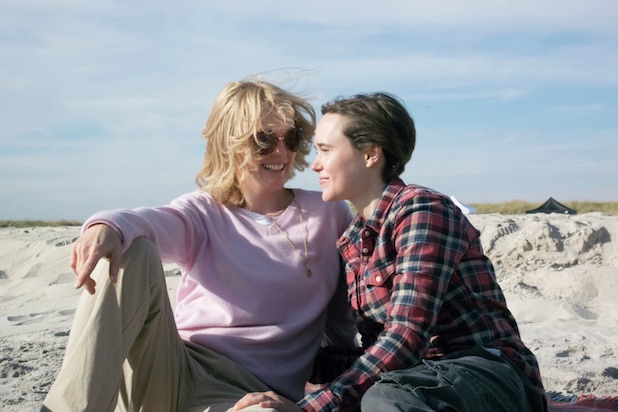
Freeheld understands this reality and is savvy in depicting it, never depriving us of the couple for longer than necessary, but also using their scenes together to dramatize the exhausting toll this fight is taking on the previously quiet privacy of their personal life. It’s a snapshot of a highly-specific moment in American politics, one that deserves to be viewed from as many angles as possible. The film is subtle not simple when it comes to its politics, and this understatedness feels earned, even risky, in the face of such an explosive issue, which isn’t always divided in ways we can expect.
“Equality,” not marriage, is what Laurel repeatedly tells Steven Goldstein she is fighting for, as the latter continually pressures her to take up this particular matter and to publicize her physical deterioration for the greater good, even in spite of her and Stacie’s own wishes. By respecting their viewpoints, their privacy, and their humanity, Freeheld is the dramatization Laurel and Stacie deserved. Together, Page and Moore layer the couple’s loving but short-lived relationship with economy and feeling; what’s seen on screen isn’t a voluptuous romance for the ages, but rather a warmly affectionate yet realistically difficult love that I think many queer couples will both discern and appreciate if they elect to see it.
And I hope that audiences, queer and otherwise, do see Freeheld in theaters. No, it’s not always the most stylish or stimulating late-year release, but it’s a touching story that intelligently communicates the high price of progress. That’s actually a twofold price, one that includes Laurel and Stacie’s struggle, but also the very future of American queer cinema.
Allowing a film as accomplished as Freeheld to go down so noiselessly only signals to Hollywood that audiences won’t actually come out for LGBTQ films and will likely make these movies even more of a gamble to get off the ground. That doesn’t mean that every single queer film needs to be seen, including the Stonewalls. Freeheld deserves to be viewed and discussed based on its own considerable merits, but it’s also a project through which broader and more inclusive change can finally be realized. Sometimes simply getting oneself to the theater and plopping down some dollars is enough to guarantee progress, or at least advance us even closer towards it, which isn’t to say that things haven’t changed at all.
In 1993’s Oscar-winning AIDS drama Philadelphia, penned by Freeheld scribe Nyswaner, Tom Hanks famously declined to kiss co-star Antonio Banderas, which means that Hanks’ dying lawyer barely lays a hand on his partner, even in the final moments of his life.
In Freeheld, Moore and Page regularly express their characters’ passion with such unruffled romantic ease that we barely even notice. They kiss. They embrace. They go to bed with one another.
Intimacy of this nature doesn’t always need to be drawn attention to. But in its own subdued way, this, too, is progress. And it deserves to be seen.
